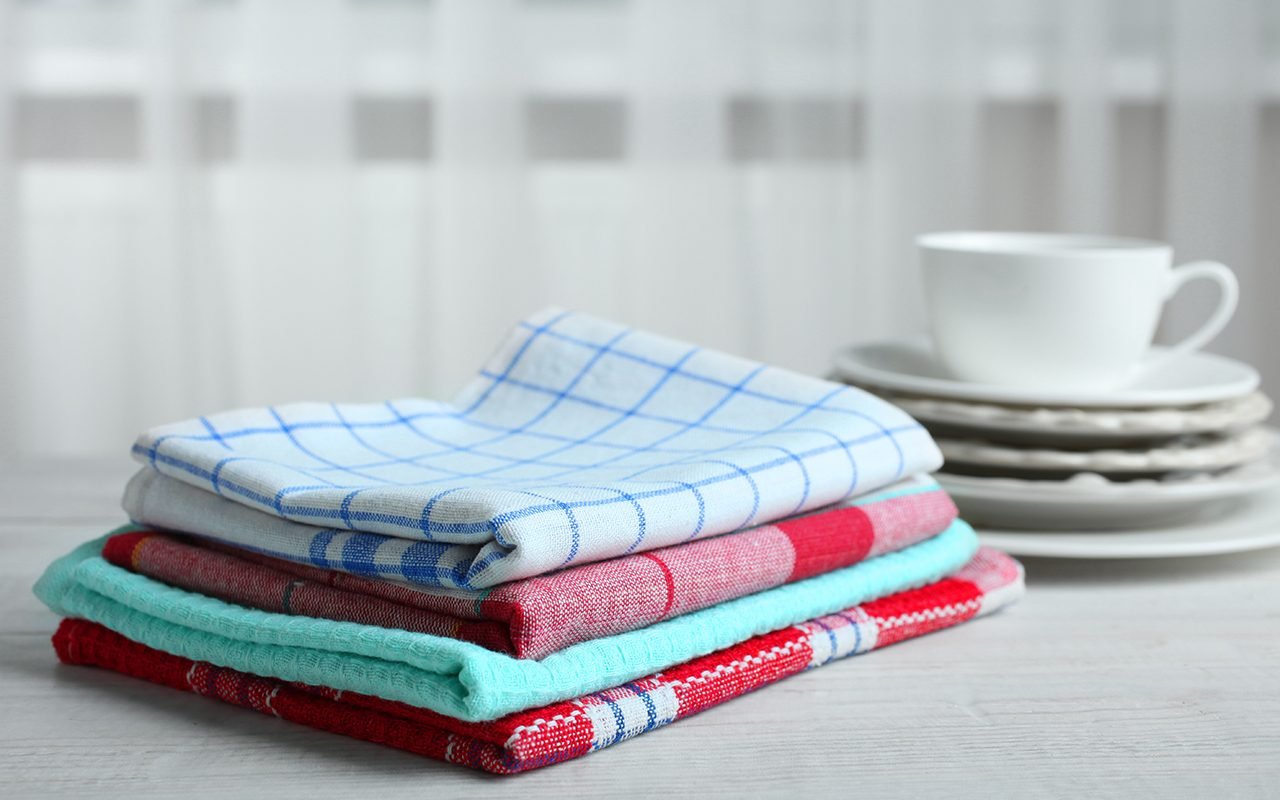How do you disinfect kitchen towels? You can disinfect kitchen towels through several methods, including washing them in hot water with bleach, using natural disinfectants like vinegar, or even microwaving them. This article explores the best ways to sanitize kitchen cloths and maintain kitchen towel hygiene to keep your kitchen safe.

Image Source: www.tasteofhome.com
Why Disinfecting Kitchen Towels Matters
Kitchen towels are a must-have for soaking up spills, drying your hands, and keeping your counters clean. But because they touch so many things—like raw meat juices, messy counters, and dirty hands—they can quickly become a home for germs and bacteria.
If you don’t properly deep-clean and disinfect them, those towels can actually spread germs around your kitchen instead of cleaning them up, which could make your family sick. Keeping your kitchen towels germ-free is one of the best ways to keep your home healthy.
The Germy Truth About Kitchen Towels
Studies have shown that kitchen towels often harbor more bacteria than toilet seats! This is because they are frequently damp, providing an ideal environment for bacterial growth. Common culprits found on kitchen towels include:
- E. coli: Can cause severe stomach cramps, diarrhea, and vomiting.
- Salmonella: Often found in raw poultry and can lead to fever, diarrhea, and abdominal cramps.
- Staphylococcus aureus: Can cause skin infections, pneumonia, and even bloodstream infections.
- Campylobacter: A common cause of diarrhea, abdominal pain, and fever.
These germs can easily transfer to your hands, food, and kitchen surfaces, increasing the risk of foodborne illnesses. Regular disinfection is therefore crucial to maintaining a safe and healthy kitchen environment. Good kitchen towel hygiene tips prevent the spread of illness.
Effective Methods for Disinfecting Kitchen Towels
Several methods can effectively disinfect kitchen towels, each with its own advantages and disadvantages. Let’s explore the most common and efficient techniques:
Washing Kitchen Towels Hot Water and Bleach
Washing machines are great for cleaning, but bacteria can survive even a wash cycle. To truly disinfect:
- Separate: Wash kitchen towels separately from other laundry. This prevents cross-contamination.
- Hot Water: Use the hottest water setting available on your washing machine (ideally 140°F or 60°C). Hot water helps kill many bacteria and viruses. Washing kitchen towels hot water is very effective.
- Detergent: Use a good-quality laundry detergent.
- Bleach (Optional): Add 1/2 cup of chlorine bleach to the bleach dispenser. Disinfecting kitchen towels bleach is a very effective method. Note: Only use bleach on white or bleach-safe towels to prevent discoloration.
- Extended Wash Cycle: Choose a longer wash cycle to ensure thorough cleaning.
- Dry Thoroughly: After washing, dry the towels in a hot dryer. High heat helps eliminate any remaining germs.
Important Considerations:
- Color-Safe Bleach: If you have colored towels, consider using color-safe bleach or an alternative disinfecting method.
- Bleach Alternatives: If you prefer not to use bleach, consider using a laundry sanitizer containing pine oil or quaternary ammonium compounds.
- Frequency: Wash kitchen towels every 1-2 days, or more frequently if they are heavily soiled or used for cleaning up raw meat juices.
Natural Disinfectants for Kitchen Towels
If you prefer to avoid harsh chemicals like bleach, several natural disinfectants can effectively clean your kitchen towels.
-
Vinegar: White vinegar is a natural disinfectant that can kill many common household germs.
- How to Use: Add 1 cup of white vinegar to the washing machine along with your regular detergent.
-
Benefits: Vinegar also helps soften fabrics and remove odors.
2. Baking Soda: Baking soda is a mild alkali that can help lift dirt and grime. -
How to Use: Add 1/2 cup of baking soda to the washing machine along with your regular detergent.
-
Benefits: Baking soda also helps deodorize and brighten fabrics.
3. Lemon Juice: Lemon juice contains citric acid, which has antibacterial properties. -
How to Use: Add 1/2 cup of lemon juice to the washing machine along with your regular detergent.
-
Benefits: Lemon juice also helps brighten fabrics and leaves a fresh scent.
4. Essential Oils: Certain essential oils, like tea tree, eucalyptus, and lavender, have antimicrobial properties. -
How to Use: Add a few drops of essential oil to the washing machine along with your regular detergent.
- Benefits: Essential oils provide a pleasant scent and can help boost the disinfecting power of your wash.
Natural disinfectants for kitchen towels are a gentler option.
Microwave Disinfection Kitchen Towels
Microwaving can be a quick way to kill germs on kitchen towels. However, it must be done safely to prevent fires.
- Wet the Towel: Thoroughly wet the kitchen towel with water. The moisture is essential for generating steam, which kills the bacteria.
- Microwave: Place the wet towel in the microwave.
- Heat: Microwave on high for 1-2 minutes. The time depends on the microwave’s power. Watch carefully to prevent the towel from drying out and potentially catching fire.
- Cool: Let the towel cool slightly before removing it from the microwave. It will be very hot!
- Dry: Hang the towel to dry completely.
Important Considerations:
- Safety: Never microwave a dry towel, as it can easily catch fire.
- Supervision: Always supervise the microwaving process and stop immediately if you see sparks or smoke.
- Effectiveness: While microwaving can kill many germs, it may not be as effective as washing with bleach or other disinfecting methods.
Boiling Kitchen Towels
Boiling kitchen towels is an old-fashioned but effective way to sanitize them.
- Fill a Pot: Fill a large pot with water and bring it to a rolling boil.
- Add Towels: Carefully add the kitchen towels to the boiling water.
- Boil: Boil the towels for 10-15 minutes.
- Remove: Carefully remove the towels from the boiling water using tongs.
- Dry: Hang the towels to dry completely.
Important Considerations:
- Safety: Use caution when handling boiling water and hot towels to avoid burns.
- Fabric: Boiling can damage delicate fabrics, so only use this method on durable cotton or linen towels.
- Detergent: You can add a small amount of detergent to the boiling water for extra cleaning power.
Best Practices for Kitchen Towel Hygiene
Beyond disinfecting, good kitchen towel hygiene involves several everyday practices to prevent the spread of germs.
Designate Specific Towels for Specific Tasks
Use different towels for different tasks to avoid cross-contamination. For example:
- Hand Towels: Use separate towels for drying hands only.
- Dish Towels: Use separate towels for drying dishes and utensils.
- Cleaning Towels: Use separate towels for wiping countertops and spills.
Clearly label each towel or use different colors to help family members distinguish between them.
Replace Towels Frequently
Change kitchen towels at least once a day, or more often if they become soiled or damp. Damp towels are breeding grounds for bacteria.
Hang Towels to Dry Properly
After each use, hang kitchen towels to dry completely. This prevents moisture buildup and reduces the risk of bacterial growth. Use towel racks or hooks that allow for good air circulation.
Avoid Sharing Towels
Avoid sharing kitchen towels with other members of the household, especially if someone is sick. Each person should have their own designated towels.
Store Clean Towels Properly
Store clean kitchen towels in a dry, clean place. Avoid storing them in damp or humid areas, as this can encourage bacterial growth.
Comparing Disinfection Methods
| Method | Effectiveness | Pros | Cons |
|---|---|---|---|
| Hot Water and Bleach | Very High | Kills most germs and bacteria, readily available | Can damage fabrics, may irritate skin, not environmentally friendly |
| Natural Disinfectants (Vinegar, etc.) | Moderate | Safer for fabrics, environmentally friendly, less irritating | May not kill all germs, requires higher concentrations or longer contact times |
| Microwave | Moderate | Quick, easy, good for spot disinfecting | Can be a fire hazard if not done correctly, may not be as effective as other methods |
| Boiling | High | Effective, no chemicals needed | Can damage delicate fabrics, requires careful handling of hot water |
Fathoming the Role of Proper Drying
Proper drying is as important as the cleaning method itself. Dampness fosters bacterial growth. Always ensure that kitchen towels are thoroughly dried after washing and each use. Consider using a hot dryer or hanging them in a well-ventilated area. Sunlight also acts as a natural disinfectant, so drying towels outdoors when possible is beneficial.
Kitchen Towel Hygiene Tips: A Summary
- Wash towels frequently (every 1-2 days).
- Use hot water and bleach (or a suitable alternative).
- Dry towels thoroughly.
- Designate specific towels for specific tasks.
- Replace towels daily.
- Hang towels to dry after each use.
- Avoid sharing towels.
- Store clean towels properly.
By following these best practices and tips, you can ensure that your kitchen towels are clean, sanitary, and safe to use. Cleaning kitchen towels effectively is key to a healthy kitchen.
FAQ: Disinfecting Kitchen Towels
Can I use the same kitchen towel to dry dishes and wipe countertops?
No, it is best to use separate towels for different tasks to prevent cross-contamination. Use one towel for drying dishes and another for wiping countertops.
How often should I wash my kitchen towels?
You should wash your kitchen towels every 1-2 days, or more frequently if they become heavily soiled or damp.
Is it safe to use bleach on colored kitchen towels?
No, chlorine bleach can discolor colored towels. Use color-safe bleach or an alternative disinfecting method like vinegar.
Can I use fabric softener when washing kitchen towels?
Avoid using fabric softener when washing kitchen towels, as it can reduce their absorbency.
What is the best way to disinfect dish towels that have been used to clean up raw meat juices?
The best way to disinfect dish towels that have been used to clean up raw meat juices is to wash them in hot water with bleach.
Is microwaving kitchen towels a safe way to disinfect them?
Microwaving can be a quick way to kill germs, but it must be done safely. Always wet the towel thoroughly before microwaving and watch carefully to prevent fires.
Are natural disinfectants like vinegar and baking soda effective for cleaning kitchen towels?
Yes, natural disinfectants like vinegar and baking soda can be effective for cleaning kitchen towels, but they may not kill all germs as effectively as bleach.
How do I get rid of bad smells in my kitchen towels?
To get rid of bad smells in your kitchen towels, try washing them with white vinegar or baking soda. You can also try soaking them in a solution of water and vinegar before washing.
What should I do if my kitchen towels are stained?
To remove stains from your kitchen towels, try pretreating them with a stain remover or soaking them in a solution of water and baking soda before washing.
How do I store my kitchen towels to keep them clean?
Store your clean kitchen towels in a dry, clean place. Avoid storing them in damp or humid areas, as this can encourage bacterial growth.

Hi, I’m Larry Fish, the mind behind MyGrinderGuide.com.. With a passion for all things kitchen appliances, I created this blog to share my hands-on experience and expert knowledge. Whether it’s helping you choose the right tools for your culinary adventures or offering tips to make your kitchen more efficient, I’m here to guide you. My goal is to make your time in the kitchen not only easier but also enjoyable! Welcome to my world of kitchen mastery!
